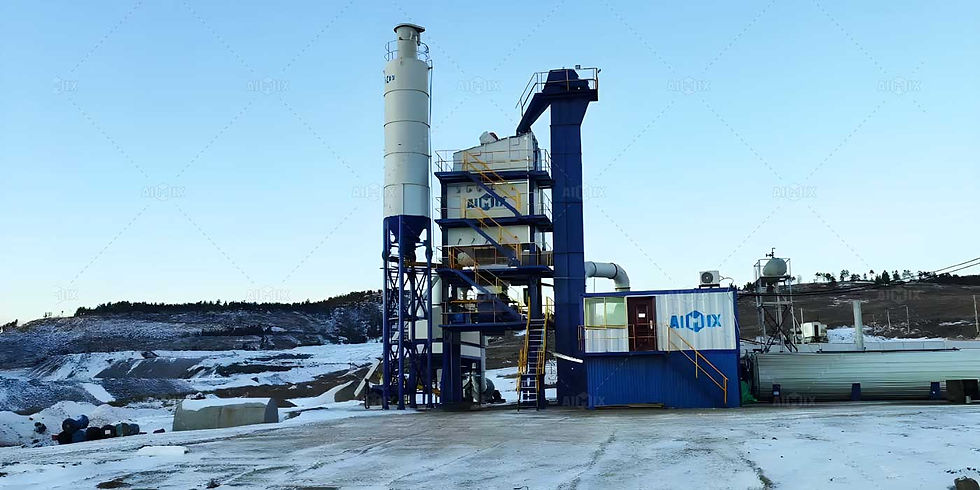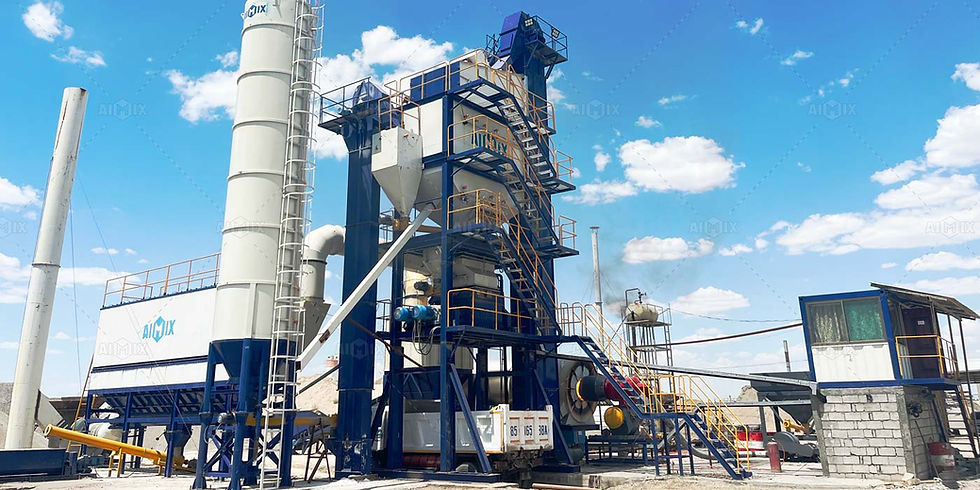How Do Asphalt Plants Work? Understanding the Types of Asphalt Plants
- aimixglobal5
- Dec 11, 2024
- 4 min read
Asphalt plants play a vital role in road construction, especially for large-scale infrastructure projects. Understanding how they work and the different types available can help you make informed decisions for your projects. Whether you're involved in road construction, commercial projects, or small-scale works, the right asphalt plant can improve efficiency, reduce costs, and ensure high-quality output. In this post, we'll break down the types of asphalt plants and how do asphalt plants work, providing key insights that can guide your decision-making process.

The Importance of Asphalt Plants in Construction Projects
Asphalt is one of the most widely used materials in construction, particularly for paving roads, highways, and other infrastructure. To meet the demand for consistent quality and reliable supply, asphalt plants are essential. These plants mix various components—such as aggregates, bitumen, and additives—into a uniform asphalt mix. This process is crucial for ensuring durability, smoothness, and performance of the asphalt when applied on the roads. But to choose the right asphalt plant for your needs, you first need to understand how they work and what are the asphalt plant parts.
Different Types of Asphalt Plants
Asphalt plants come in different types, each designed for specific applications and project sizes. Here, we will take a closer look at the main types: batch plants, drum plants, and portable plants.
1. Batch Plants: The Ideal Choice for Quality and Precision
Batch plants are the most commonly used type in large-scale projects where precision and quality control are paramount. In batch plants, asphalt is produced in batches, ensuring each batch meets exact specifications. This type of plant allows for high customization, as different mixes can be made for various job requirements. Batch plants are also well-suited for producing small to medium quantities of asphalt.
However, while batch plants offer excellent quality control, they tend to have a slower production process compared to other types. This means they may not be as efficient for projects requiring large volumes of asphalt within tight timelines. Nonetheless, their versatility and precision make them ideal for projects that prioritize quality over speed.
2. Drum Mix Plants: High Efficiency for Large-Scale Operations
Drum mix plants, on the other hand, are designed for continuous asphalt production. In these plants, the mixing process occurs in a rotating drum, which ensures that the components are continuously mixed as they move through the drum. This makes drum mix plants more efficient and faster compared to batch plants, which is particularly beneficial for large-scale projects with high asphalt demands.
The continuous production method of drum mix plants results in a more consistent supply of asphalt. However, these plants are less flexible when it comes to producing different asphalt mixes. They excel in high-volume projects but may not be the best option for highly specialized or custom mixes.
3. Portable Asphalt Plants: Flexibility for Smaller Projects
For smaller construction projects or locations with limited space, portable asphalt plants offer a flexible and cost-effective solution. These plants are designed for mobility, allowing them to be relocated quickly and set up at different job sites. Portable asphalt plants are typically smaller and can be used for smaller-scale projects that don't require large quantities of asphalt.
While portable plants offer excellent flexibility and ease of transport, they may not provide the same production capacity or level of precision as larger batch or drum mix plants. However, they are perfect for contractors working on localized projects with the need for quick setup and on-site production.

How Asphalt Plants Operate: The Process Behind the Mix
Regardless of the type, the hot mix plant for sale can follow a similar general process. The key steps include mixing aggregates, adding bitumen, and ensuring proper heating and blending. Let's dive into the operation process:
1. Aggregate Handling
The first step in the asphalt production process involves the collection and drying of aggregates, which are essential components like sand, gravel, and crushed stone. The aggregates are heated in the dryer drum to remove any moisture and achieve the desired temperature before mixing.
2. Mixing with Bitumen
Next, the dried aggregates are mixed with bitumen. The hot mix ensures that the asphalt can be easily applied to roads and surfaces. The amount of bitumen added determines the final quality and properties of the asphalt. The plant’s controls help ensure precise mixing to achieve a uniform and high-quality product.
3. Output and Storage
Once mixed, the asphalt is stored in silos to keep it at the proper temperature until it's ready for use. Some plants feature advanced storage systems that allow for controlled temperature management to ensure the asphalt remains workable during transport to job sites.
Why Choose the Right Asphalt Plant?
Choosing the right asphalt plant for your project is crucial for optimizing both quality and efficiency. Factors like project size, location, production capacity, and mix specifications should guide your choice. The type of plant you choose directly impacts not only the quality of your asphalt but also your overall project timeline and budget.

Why AIMIX is Your Ideal Partner for Asphalt Plants
At AIMIX, we offer a wide range of asphalt plants tailored to meet your specific needs. Whether you need a batch plant for precision, a drum mix plant for high efficiency, or a portable plant for flexibility, we have the perfect solution. Our asphalt plants are built with advanced technology to ensure reliable performance and long-lasting results. We focus on delivering high-quality equipment that improves your project efficiency and helps you meet your construction goals.
By choosing AIMIX, you're not just getting a machine; you're investing in a partner who is committed to your success. Let us help you take your construction projects to the next level with reliable, efficient, and cost-effective asphalt plant solutions.
Get in Touch with AIMIX Today!
If you're looking for top-notch asphalt plants that meet your project needs, contact AIMIX today. Our team is ready to assist you in selecting the best equipment and providing expert guidance to ensure the success of your projects.



Comments